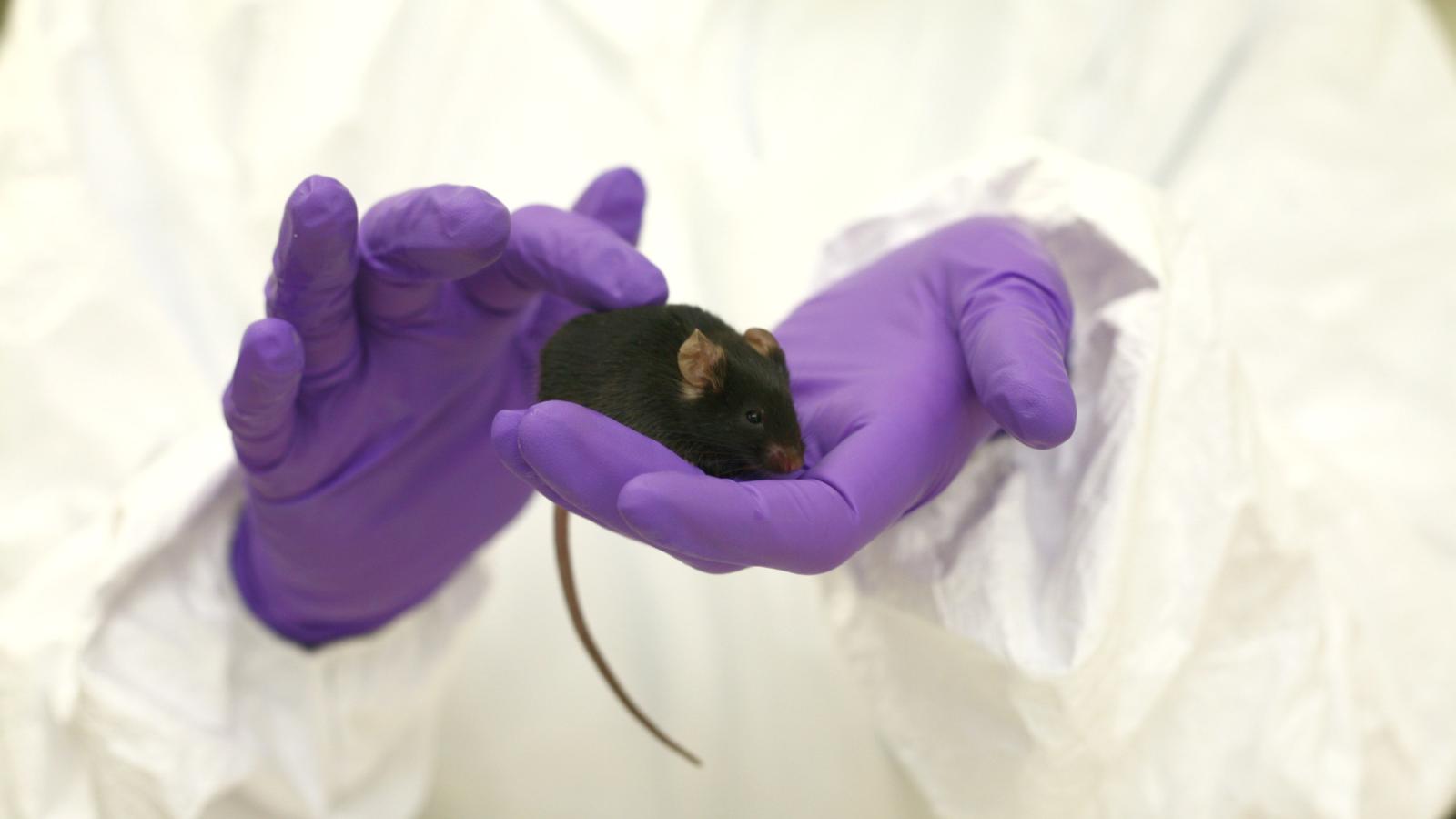The UK DRI’s mission is to make a real difference to people living with dementia, their carers and their loved ones. To achieve this, our 800+ researchers are working to understand the biological mechanisms of neurodegenerative diseases, deepen our understanding of what drives them, and transform that knowledge into new tools, diagnostics, and treatments.
Animals are used in biomedical research to gain a better understanding of biological processes where these cannot be modelled by non-animal approaches, and this knowledge paves the way for medical advances. Many of the major breakthroughs that underpin modern medicine – including antibiotics, treatments for cancer and HIV, transplants, and vaccines – would not have been possible without the use of animals in research.
Alternative non-animal methods have been and continue to be developed. This helps us improve the welfare of laboratory animals and to reduce or in some cases replace the use of animals in our research. However, these non-animal methods cannot yet capture the complex interaction between biological systems in the same way as a whole vertebrate model organism, which is why a proportion of the research we conduct requires the use of animals. The brain is arguably our most complex organ, both in terms of diversity of cell types and complexity of function. There is also strong evidence that other bodily systems play important roles in the progression of neurodegenerative diseases, including the cardiovascular, metabolic and immune systems. This multiplicity of processes involved in disease development cannot yet be studied using non-animal methods alone. Animal research therefore remains essential to furthering our understanding of these diseases, their complex progression, and their impact on cognition and behaviour.
UK DRI commitment to the “3Rs”: replace, reduce and refine
The UK DRI is committed to enabling the use of non-animal alternatives wherever possible. Our animal research policy is guided and informed by the principles of the 3Rs from the National Centre for the Replacement, Refinement and Reduction of Animals in Research (NC3Rs) to replace, refine and reduce animal studies. It is aligned with the policies and position statements of our founding funders the Medical Research Council (MRC), Alzheimer’s Research UK (ARUK) and Alzheimer’s Society. We support the Association of Medical Research Charities (AMRC)’s position on using animals in research adhering to the principles of the 3Rs.
Through our dedicated Animal Models Programme, all UK DRI researchers are offered robust guidance and supported to achieve the highest 3R standards, and we also support the development of alternative methods. The UK DRI runs an annual 3Rs prize to recognise excellence in the replacement, reduction or refinement of the use of animals in UK DRI research.
UK DRI policy and governance
The UK DRI’s animal research policy and governance can be accessed in full here. It ensures that ethical review processes are robust; animals are only used once alternatives have been fully explored; and all research is compliant with UK law on scientific research and testing involving animals.
On animal welfare, our policy makes several stipulations in line with the 3Rs and the ARRIVE guidelines for best practice. Our researchers must ensure that the simplest possible (or least sentient) species is used and that its use is fully justified; the number of animals used must be minimised whilst ensuring the results are robust; and pain, suffering, distress and lasting harm should be avoided, or when not possible minimised to maintain a high standard of welfare.
Transparency and reporting at UK DRI
The UK DRI is fully transparent about its use of animals in research. We are required to report in full to the Home Office annually on our use of animals in our science.
In addition, as a signatory of the Concordat on Openness on Animal Research, the UK DRI has committed to:
- Be clear about when, how and why we use animals in research
- Enhance our communications with the media and the public about our research using animals
- Be proactive in providing opportunities for the public to find out about research using animals
- Report on progress annually and share our experiences
Use and development of non-animal alternatives at the UK DRI
UK DRI researchers use a wide range of non-animal methods including tissue culture, computer modelling, clinical studies, and biomarker development using human biofluids and brain imaging. Our researchers use of organoids, or “mini brains”, which are grown from human stem cells to mimic certain elements of the an organ. The use of induced pluripotent stem cell-based modelling is widespread across the Institute.
We are committed to developing and refining new research techniques, including advances in non-animal methods, and sharing these with the wider scientific community. The UK DRI is investing to pioneer new research tools and platforms, which will be available to researchers around the world:
iPSC Platform to Model Alzheimer’s Disease Risk (IPMAR)
A major new initiative led by UK DRI at Cardiff, which aims to become one of the foremost cellular model resources available to study Alzheimer’s disease. Our researchers will create and validate up to 60 human-derived iPSC lines for generating models with high and low polygenic risk for Alzheimer’s. This will help researchers to explore risk factors that contribute to development of the disease.
Multi-‘omics Atlas Project (MAP)
A £2M Directors’ initiative led by UK DRI at Imperial, which is creating an ‘atlas’ of the brain at different stages of Alzheimer’s disease. It is the first time that UK brain tissue resources have been coordinated on such a scale to study Alzheimer’s disease pathology at every stage of the condition, and is set to rapidly improve our understanding of the processes that lead to people developing the condition.
